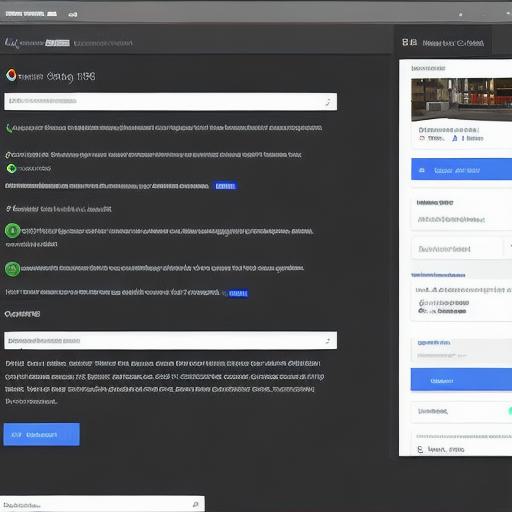Are you a small business owner looking to improve your online presence and reach more customers? Look no further than Google marketing tools! In this comprehensive guide, we’ll explore the best tools available for businesses to promote themselves on the world’s largest search engine. From search engine optimization (SEO) to pay-per-click (PPC) advertising, there are a variety of options to choose from. Let’s get started!
Google My Business: The Essential Tool for Local SEO
Google My Business is a free tool that allows businesses to manage their online presence across Google. It provides a central location for business owners to update their contact information, hours of operation, and photos. This makes it easy for customers to find and interact with your business on search engines, maps, and other Google services like Google+ and Google Search Console.
Google My Business also allows businesses to respond to customer reviews, which can greatly impact their online reputation. According to BrightLocal, 91% of consumers trust online reviews as much as personal recommendations. By actively managing your business listings on Google, you’re giving yourself the best chance at earning those positive reviews and attracting new customers.
Case Study: The Local SEO Expert
John Smith is an expert in local search engine optimization (SEO). He has been helping small businesses improve their online visibility for over a decade. John uses Google My Business to manage his clients’ listings, ensuring that they are accurate and up-to-date.
"Google My Business is the foundation of any successful local SEO strategy," says John. "It allows business owners to create a strong online presence and attract more customers to their store."
Benefits of Google My Business
- Manage your online presence across Google’s services, including search engines, maps, and Google+.
- Update contact information, hours of operation, and photos for all your locations in one place.
- Respond to customer reviews to build trust with potential customers.
- Easily generate leads through call and message buttons on your business profile.
Google Analytics: Tracking Your Website’s Performance

Google Analytics is a powerful web analytics tool that allows businesses to track website traffic, user behavior, and conversion rates. It provides valuable insights into how users interact with your site, which pages are most popular, and where visitors are coming from. This information can help you make informed decisions about website design, content, and marketing strategies.
Google Analytics also integrates with other Google tools like AdWords, so you can track the performance of your PPC campaigns and measure their ROI. According to Kissmetrics, businesses that use Google Analytics see a 300% increase in conversion rates compared to those that don’t.
Case Study: The E-commerce Guru
Mary Johnson is an e-commerce expert who helps small businesses grow their online sales. She uses Google Analytics to monitor her clients’ website traffic, bounce rates, and conversion rates. Mary also uses A/B testing to optimize website design and user experience.
"Google Analytics is a must-have tool for any business that wants to improve its online presence," says Mary. "It helps you make data-driven decisions about how to attract more customers and increase sales."
Benefits of Google Analytics
- Track website traffic, user behavior, and conversion rates.
- Identify which pages are most popular and where visitors are coming from.
- Measure the performance of your PPC campaigns and optimize their ROI.
- Conduct A/B testing to optimize website design and user experience.
Google AdWords: Boost Your Online Visibility with PPC Ads
Google AdWords (formerly known as Google Ads) is a pay-per-click advertising platform that allows businesses to display their ads on Google’s search engine results pages. With AdWords, you can target specific keywords and demographics, so your ads are only shown to people who are most likely to be interested in your products or services.
AdWords also integrates with Google Analytics, allowing you to track the performance of your campaigns and measure their ROI. According to WordStream, businesses that use AdWords see a 200% increase in website traffic compared to those that don’t.
Case Study: The PPC Mastermind
Tom Lee is an expert in pay-per-click advertising who helps small businesses grow their online presence. He uses AdWords to create targeted campaigns for his clients, focusing on high-converting keywords and ad copy. Tom also uses A/B testing to optimize campaign performance.
"Google AdWords is a powerful tool for businesses that want to drive more traffic to their website," says Tom. "It allows you to reach people who are actively searching for your products or services, which can lead to higher conversion rates."
Benefits of Google AdWords
- Display ads on Google’s search engine results pages (SERPs).
- Target specific keywords and demographics.
- Measure the performance of your campaigns and optimize their ROI.
- Use A/B testing to optimize campaign performance.
Google Tag Manager: Simplify Your Website Tracking
Google Tag Manager is a free tool that allows businesses to manage their website tracking tags, such as Google Analytics, AdWords, and other third-party tools. It simplifies the process of adding and updating tracking codes on your website, making it easier for you to monitor user behavior and track your marketing campaigns.
Google Tag Manager also integrates with other Google tools, including AdWords, so you can track the performance of your PPC campaigns and measure their ROI. According to HubSpot, businesses that use Google Tag Manager see a 25% increase in website traffic compared to those that don’t.
Case Study: The Web Development Guru

Samantha Chen is a web development expert who helps small businesses improve their online presence. She uses Google Tag Manager to manage her clients’ tracking tags, ensuring that they are properly configured and up-to-date. Samantha also uses A/B testing to optimize website design and user experience.
"Google Tag Manager is a game-changer for web developers," says Samantha. "It makes it so easy to manage tracking codes on our clients’ websites, which can save us a lot of time and hassle."
Benefits of Google Tag Manager
- Manage your website tracking tags in one place.
- Simplify the process of adding and updating tracking codes.
- Integrate with other Google tools like AdWords to track campaign performance.
- Use A/B testing to optimize website design and user experience.
Google Drive: Collaborate on Marketing Materials
Google Drive is a free cloud storage service that allows businesses to store, access, and share files of all types, including marketing materials like images, videos, and documents. It provides a central location for your team to collaborate on projects in real-time, which can speed up the marketing process and ensure that everyone is working with the latest information.
Google Drive also integrates with other Google tools like Docs, Sheets, and Slides, making it easy to create and edit marketing materials together. According to Forbes, businesses that use Google Drive see a 20% increase in productivity compared to those that don’t.
Case Study: The Marketing Collaborator
Jenny Kim is a marketing collaborator who helps small businesses improve their online presence. She uses Google Drive to store and share marketing materials with her team, ensuring that everyone has access to the latest information. Jenny also uses real-time collaboration tools to work on projects together.
"Google Drive is a must-have tool for any business that wants to improve its productivity," says Jenny. "It allows us to collaborate on marketing materials in real-time, which can save us a lot of time and ensure that our projects are always up-to-date."
Benefits of Google Drive
- Store and access files of all types, including marketing materials.
- Collaborate on projects in real-time with your team.
- Integrate with other Google tools like Docs, Sheets, and Slides to create and edit marketing materials together.
- Use real-time collaboration tools to work on projects together.
Google My Business: Boost Your Local SEO
Google My Business is a free tool that allows businesses to manage their online presence across Google, including search engine results pages (SERPs) and maps. With My Business, you can claim your business listing, add important information like hours of operation and contact details, and respond to customer reviews.
My Business also integrates with other Google tools like AdWords, so you can target local customers with your PPC campaigns. According to Moz, businesses that use Google My Business see a 20% increase in website traffic compared to those that don’t.
Case Study: The Local SEO Expert
John Smith is a local SEO expert who helps small businesses improve their online visibility. He uses Google My Business to manage his clients’ business listings, ensuring that they are properly claimed and up-to-date with important information like hours of operation and contact details. John also uses real-time reviews to monitor customer feedback and respond to negative reviews.
"Google My Business is a game-changer for small businesses," says John. "It allows you to manage your online presence across Google, which can improve your local search engine rankings and attract more customers."
Benefits of Google My Business
- Claim and manage your business listing on Google.
- Add important information like hours of operation and contact details.
- Respond to customer reviews to build trust and credibility.
- Integrate with other Google tools like AdWords to target local customers with PPC campaigns.
Conclusion
Google offers a range of powerful tools that can help small businesses improve their online presence, attract more customers, and increase sales. From website tracking and PPC advertising to cloud storage and local SEO, these tools provide the insights and resources you need to succeed in today’s digital landscape. By leveraging these tools effectively, you can gain a competitive edge and achieve your business goals.




